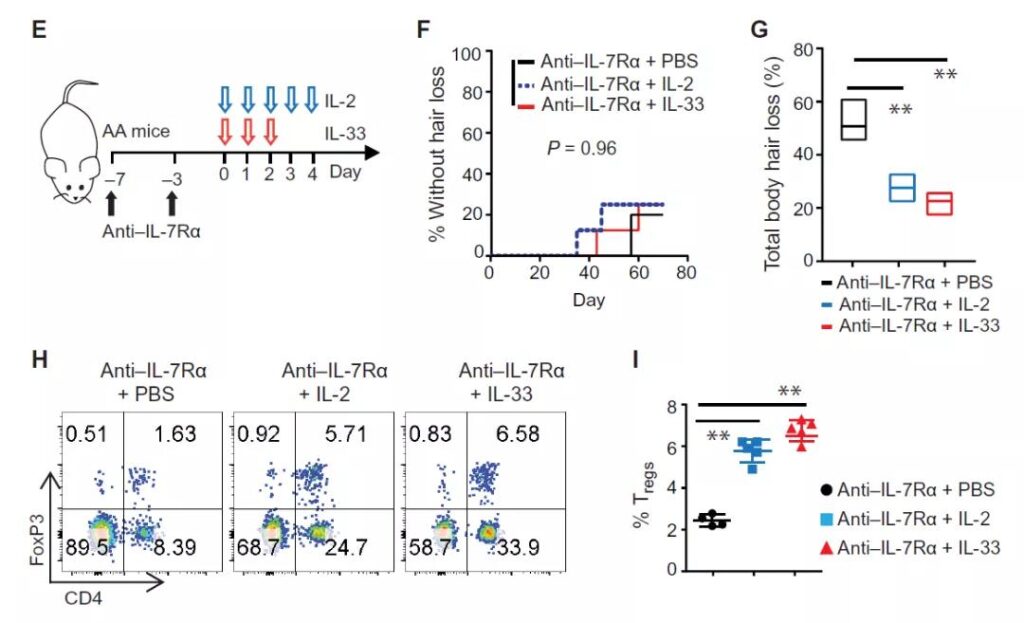Blocking IL-7 can inhibit inflammation and reverse alopecia areata
- Normal Liver Cells Found to Promote Cancer Metastasis to the Liver
- Nearly 80% Complete Remission: Breakthrough in ADC Anti-Tumor Treatment
- Vaccination Against Common Diseases May Prevent Dementia!
- New Alzheimer’s Disease (AD) Diagnosis and Staging Criteria
- Breakthrough in Alzheimer’s Disease: New Nasal Spray Halts Cognitive Decline by Targeting Toxic Protein
- Can the Tap Water at the Paris Olympics be Drunk Directly?
Blocking IL-7 can inhibit inflammation and reverse alopecia areata
Blocking IL-7 can inhibit inflammation and reverse alopecia areata. Alopecia Areata (Alopecia Areata) is an autoimmune disease mediated by T cells. It is caused by cytotoxic CD8+ T cell activity, cytokine release and hair follicle apoptosis due to genetic and environmental factors.
Alopecia areata often occurs in hairy parts of the body, with normal local skin and no conscious symptoms. It can occur at any age, but it is more common in young adults and there is no significant difference in incidence between the sexes.
Previous studies have shown that the expressions of interleukins IL-2, IL-7, and IL-15 are significantly up-regulated in the skin of human and C3H/HeJ alopecia areata mouse models. Using antibodies to block IL-2 or IL-15 can prevent the development of alopecia areata in the C3H/HeJ alopecia areata mouse model, but the role of IL-7 in alopecia areata is still uncertain.
On April 2, 2021, researchers from Columbia University in the United States published a research paper titled: Blockade of IL-7 signaling suppresses inflammatory responses and reverses alopecia areata in C3H/HeJ mice in the Science Advances journal.
The study shows that IL-7 plays an important role in the occurrence and development of alopecia areata. It may be used in combination with IL-7Rα blockers or IL-7Rα blockers in combination with low-dose IL-2 or IL-33. As a potential treatment for alopecia areata.

First, the research team confirmed that IL-7 was significantly up-regulated in the diseased skin of humans and C3H/HeJ mouse models with alopecia areata.
The research team further studied the role of IL-7 in the occurrence and development of alopecia areata in the C3H/HeJ mouse model, and found that IL-7 enhanced the cytotoxic T cell type 1 (Tc1) immune response in C3H/HeJ mice. Exogenous IL-7 accelerates the onset of alopecia areata by increasing the expansion of alopecia T cells, while blocking IL-7 can inhibit the development of alopecia areata and can reverse early alopecia areata.
Although long-term blocking of IL-7Rα therapy can effectively inhibit alopecia areata, this method also has the adverse effect of significantly reducing the total number of multiple T cell subpopulations, including regulatory T cells (Treg).
Therefore, the research team tried to combine short-term blocking of IL-7Rα with low-dose cytokines that activate Treg (IL-2, IL-33) to block IL-7Rα while simultaneously activating Treg. Experimental results show that the combination therapy of short-term IL-7Rα blockers and low-dose Treg-activated cytokines can enhance the therapeutic effect of alopecia areata.

In general, this study shows that IL-7 plays an important role in the occurrence and development of alopecia areata. It can be treated by IL-7Rα blocker alone, or IL-7Rα blocker and low-dose IL-2 or IL-33. Used in combination, it may be issued as a potential treatment for alopecia areata.
(source:internet, reference only)
Disclaimer of medicaltrend.org



